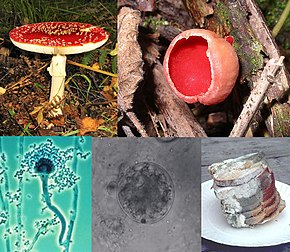Fungal
| Fungi Temporal range: Early Devonian–Recent (but see text) |
|
|---|---|
 |
|
Clockwise from top left:
|
|
| Scientific classification | |
| Domain: | Eukaryota |
| (unranked): | Unikonta |
| (unranked): | Opisthokonta |
| Kingdom: |
Fungi (L.) R.T.Moore |
| Subkingdoms/Phyla/Subphyla | |
|
Dikarya (inc. Deuteromycota) Subphyla incertae sedis |
|
Dikarya (inc. Deuteromycota)
Subphyla incertae sedis
A fungus (/ˈfʌŋɡəs/; plural: fungi or funguses) is any member of the group of eukaryotic organisms that includes unicellular microorganisms such as yeasts and molds, as well as multicellular fungi that produce familiar fruiting forms such as mushrooms and bracket fungi. These organisms are classified as a kingdom, Fungi, which is separate from the other eukaryotic life kingdoms of plants and animals.
A characteristic that places fungi in a different kingdom from plants, bacteria and some protists, is chitin in their cell walls. Similar to animals, fungi are heterotrophs; they acquire their food by absorbing dissolved molecules, typically by secreting digestive enzymes into their environment. Fungi do not photosynthesise. Growth is their means of mobility, except for spores (a few of which are flagellated), which may travel through the air or water. Fungi are the principal decomposers in ecological systems. These and other differences place fungi in a single group of related organisms, named the Eumycota (true fungi or Eumycetes), which share a common ancestor (form a monophyletic group), an interpretation that is also strongly supported by molecular phylogenetics. This fungal group is distinct from the structurally similar myxomycetes (slime molds) and oomycetes (water molds). The discipline of biology devoted to the study of fungi is known as mycology (from the Greek μύκης, mukēs, meaning "fungus"). In the past, mycology was regarded as a branch of botany, although it is now known fungi are genetically more closely related to animals than to plants.
...
Wikipedia
